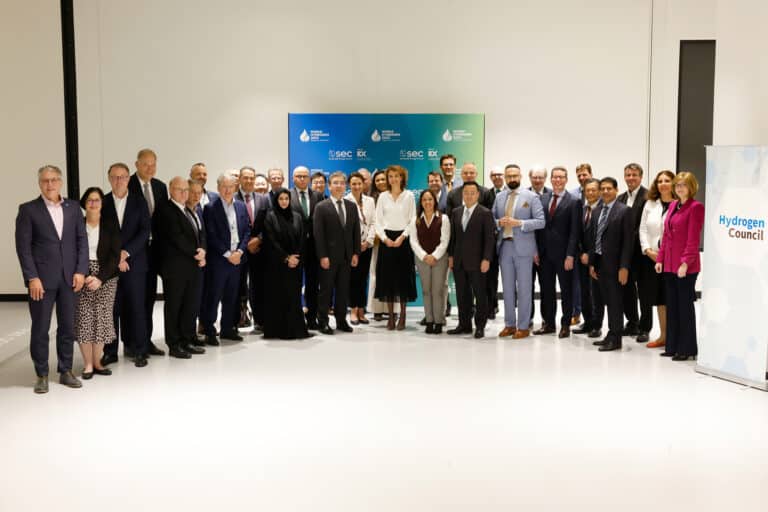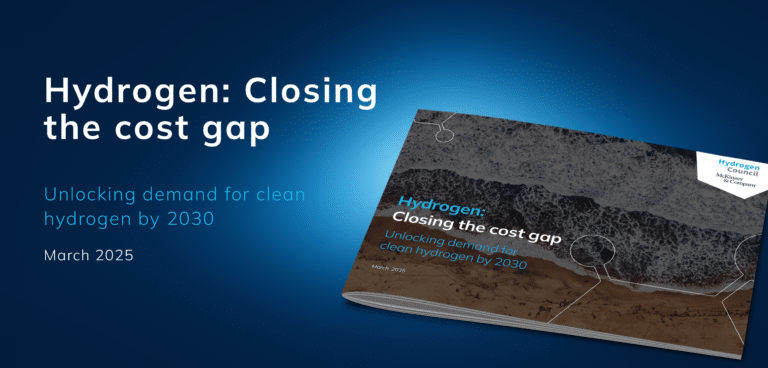The Hydrogen Council is proud to introduce Takeshi Uchiyamada, Chairman of Toyota Motor Corporation, as the coalition’s new Co-chair. Together with Hydrogen Council Co-chair since 2017, Benoît Potier, Chairman and CEO of Air Liquide, Takeshi Uchiyamada will preside over the Hydrogen Council Board and work closely with member CEOs to take the global hydrogen industry to the next level.
During my term as Co-chair, I would like to support the global response to some of today’s major challenges and help to address the pressing issue of climate change.
— Takeshi Uchiyamada, Chairman of Toyota Motor Corporation
Hyundai Motor Group Executive Vice Chairman Euisun Chung, who served as Co-chair of the Hydrogen Council throughout 2019 until July 2020, welcomes Takeshi Uchiyamada in his new role: “In this time of unprecedented challenges posed by the COVID-19 pandemic, I have full confidence that with their leadership and commitment Chairmen Potier (Air Liquide) and Uchiyamada (Toyota Motor Corporation) will drive the Hydrogen Council to a bright future.”
Learn more about our new Co-chair and his views for the hydrogen industry as we enter what will be the decade of hydrogen, in this interview.
Why is now the time to invest in and scale up hydrogen?
“Hydrogen is changing the face of transport and is poised to do even more. From powering cars to heating homes, we’re moving towards a hydrogen-based society. Unlike other energy sources, hydrogen only produces water, and is easy to store and transport in large amounts.
Over the last ten years, there have been many projects worldwide for a proof-of-concept of a hydrogen-based society; our vision is now recognised to be based on technologies that have been viably demonstrated.
Hydrogen can create significant benefits for the energy system, the environment, and the global economy. Large-scale investment in massive deployment of hydrogen technologies will build a bridge to the future – a sustainable society.”
Why should governments around the world put hydrogen at the heart of COVID-19 recovery plans?
“The COVID-19 pandemic has a serious impact on the global economy: the International Monetary Fund (IMF) forecasts that global growth is set to decrease by 4.9 percent in 2020. At the same time, the International Energy Agency (IEA) revealed the drastic reduction of carbon emissions and energy demand during the first half of 2020. In the course of a return to “business as usual”, economic recovery packages should be designed to “build back better”. While opinions may differ on recovery approaches around the world, none of us wish to come out of this crisis only to stumble into the next, which could very well be the climate crisis. Dramatic changes are needed in the ways we produce, distribute and store energy around the world, and right now we have a truly unique opportunity.”
Why is the Hydrogen Council best positioned to unite the hydrogen industry worldwide and make this the Decade of Hydrogen?
“The Council brings together some of the world’s leading companies, from upstream to downstream in the hydrogen supply chain, with a clear vision of a hydrogen-based society. With one voice for the industry, the Council promotes cooperation with key stakeholders such as policymakers, investors, international agencies and civil society. Each of these stakeholders has its own role to play to unlock the potential of hydrogen. Public-private collaboration is the only way to achieve that goal and the Council will take initiatives to further foster this cooperation.”
What do you hope to see for the global hydrogen industry during your time as Co-chair of the Hydrogen Council?
“During my term as a Co-chair, I would like to support the global response to some of today’s major challenges and help to address the pressing issue of climate change that faces all of us collectively.
Today, the Council has grown to more than ninety companies, having boosted global collaboration between governments, industries, investors, and international organisations over the past few years.
The industry is now firmly positioned to scale up hydrogen globally. Many brilliant people around the world have spent a great amount of time working on projects envisioning a hydrogen-based society, and I believe that we, as an industry, are close to realising it. This will happen region by region, based on a wide variety of market conditions and government regulations and support.
The stories we read and talk about today are global challenges – we all face them together. Similarly, they are about the opportunities we share. And these stories will find their way to the next generations. I believe there is still much to do, but the future comes only to those who aren’t afraid to face the challenges ahead. As co-chair of the Hydrogen Council, I’m proud to work with such kind of leaders.”



